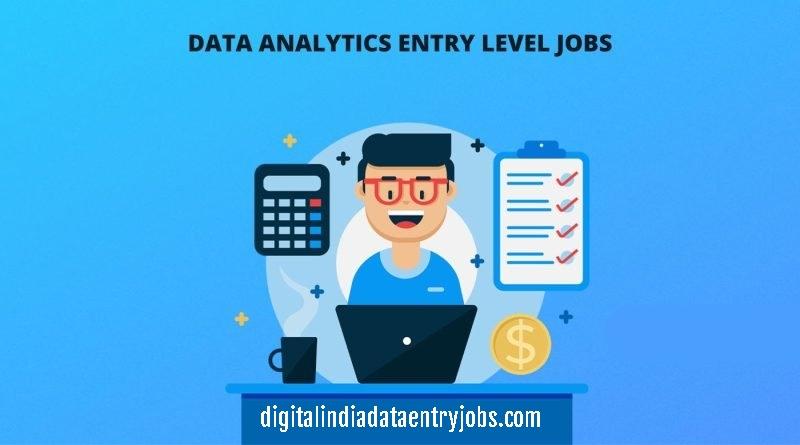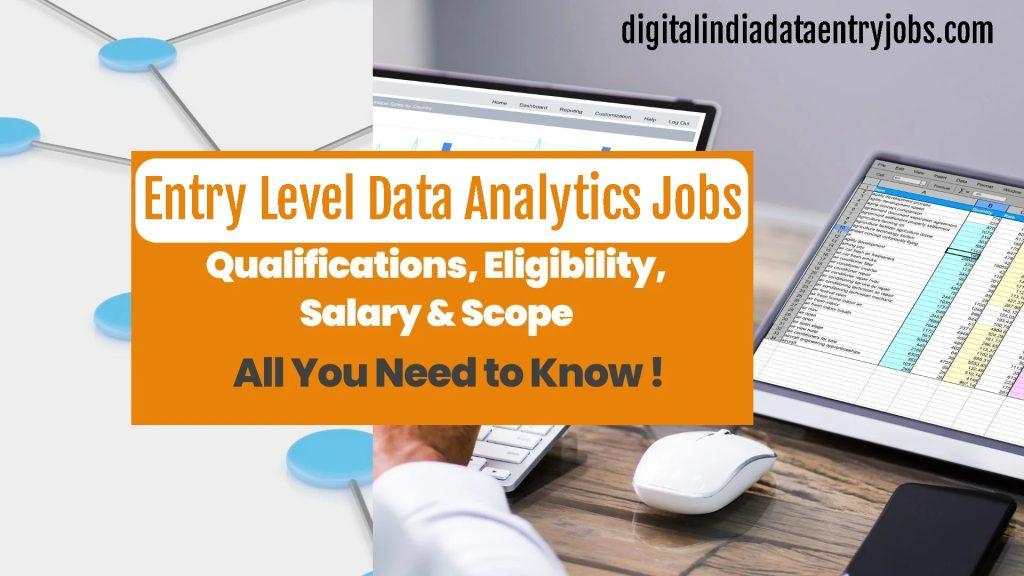Entry-Level Data Analytics Jobs:- Data analytics are now essential to corporate operations in many different industries in today’s data-driven world. There is an increasing need for qualified data analysts as more businesses look to make data-driven decisions. Getting an entry-level position in data analytics can be a fulfilling and exciting career path, but in order to stand out in the competitive job market, you must be dedicated and take a strategic approach. This in-depth guide will take you step-by-step through the necessary procedures and advice to land your ideal entry-level data analytics position.
Contents
About Data Analytics
Data analytics is the process of analyzing unprocessed data and making conclusions from it. Algorithms and automated systems designed for human use have replaced many data analytics methods and processes.
The general phrase “data analytics” encompasses a variety of data analysis methods. Data analytics techniques can be used to evaluate any kind of data and produce insights that can be used to make improvements. Through the use of data analytics tools, trends and indicators that would otherwise be lost in a sea of data can be found. The overall efficiency of a business or system can then be increased by leveraging this data to optimize procedures.
For many machines, manufacturing organizations, for instance, routinely record runtime, downtime, and work queue. They then analyze the data to better schedule jobs so that the machinery operates at peak efficiency.
Also Read:- Data Entry Jobs in Bangalore, scholarships gov, Companycontactdetail

What are the skills and qualifications required for data analytics entry-level jobs?
Certain firms and job descriptions have different requirements for entry-level positions in data analytics. Smaller startups that prioritize experiential learning could be prepared to take on entry-level data analysts with less knowledge or real-world experience. Rather, you will have to pick these up on the job.
What kinds of abilities do these kinds of employers instead look for in light of this? To put it briefly, their focus will be on wider skill sets that demonstrate your aptitude and eagerness to learn. As an illustration:
- Making choices and resolving issues
- Both analytical and imaginative thinking
- outstanding communication and interpersonal skills
- Both self-awareness and empathy for others
- Drive and inspiration
- Working together and exercising leadership
- For instance, resilience and dependability, or the capacity to handle stress
It is common to need to add technical knowledge to your “life skills” in order to land your first entry-level employment. Larger companies would want you to start immediately, therefore this is especially true for them. These are the main prerequisites:
- An undergraduate degree, ideally in computer science or data.
- Program expertise, such as in R SQL or Python, and familiarity with relational databases
- The statistical functions in Microsoft Excel competence
- The capacity to use programs like Tableau to create data visualizations
- Outstanding proficiency in statistics and maths
- Theory of machine learning and automation (beneficial, but not absolutely required for entry-level data analyst positions)
Most employers will be seeking these kinds of skills. But before applying for entry-level positions in data analytics, as usual, make sure you read the job description.

How to get an Entry Level Data Analytics Jobs–
Understanding the Field of Data Analytics
It’s important to have a firm grasp of what data analytics comprises before starting your job search. Analyzing, analyzing, and visualizing data in order to get insightful information is the process of data analytics. Learn about the various categories of data analytics, including descriptive, diagnostic, predictive, and prescriptive, as well as the industry standard tools, which include Python, R, SQL, Excel, and platforms for data visualization like Tableau and Power BI.
Acquiring the Right Skillset
Creating a broad skill set that fits the demands of an entry-level data analytics position is necessary if you want to stand out from the competition. Prioritise gaining the following competencies:
- Programming Languages: Learn the programming languages R and Python, which are popular in data analytics for modeling, analysis, and data manipulation.
- SQL: In order to effectively interface with databases, you must grasp Structured Query Language (SQL).
- Data Visualisation: To produce visually appealing data representations, become familiar with data visualization software such as Tableau, Power BI, or Matplotlib.
- Statistical Analysis: You can analyze and interpret data more successfully if you have a solid understanding of statistical concepts.
- Problem-Solving: To tackle actual data difficulties, hone your critical thinking and problem-solving abilities.
- Machine Learning: It will be helpful to have a basic understanding of machine learning models and techniques.
Pursuing Relevant Education
Although formal schooling isn’t always required, having a degree in a relevant field can greatly increase your chances of landing an entry-level data analytics job. A degree in data science, computer science, statistics, mathematics, or a similar discipline would be something to think about. To further strengthen your abilities and improve your CV, there are a plethora of data analytics certifications, online courses, and training programs available.
Building a Stellar Portfolio
Make an eye-catching portfolio to highlight your projects and practical abilities. You can host your code samples, open-source contributions, and data analytics projects on sites like GitHub. Include a range of initiatives, including data visualizations, predictive modeling, exploratory data analysis, and data cleaning. In addition to helping you stand out from the competition, a strong portfolio can convince employers of your enthusiasm and commitment.
Participating in Data Analytics Competitions
Engaging in data analytics contests, like Kaggle, is a great opportunity to push yourself and pick up useful skills. You can use your talents in a real-world setting by solving specific issues and genuine datasets offered by these competitions. Participating in competitions successfully in the past shows employers that you can handle real-world data difficulties, which is something that employers value highly.
Completing Internships and Freelance Projects
One can progress from an internship to a data analytics entry-level position through freelancing work and projects. Seek out options for freelance work or internships that fit your interests and skill set. These experiences give you invaluable practical experience as well as the chance to network and form business partnerships within the sector.
Networking in the Data Analytics Community
Making connections is a great way to advance your career. Join specialists in the field by going to data analytics conferences, webinars, and meetings. Participate in conversations on social networking sites where you may contribute your expertise, such as LinkedIn and Twitter. Through networking, one may receive helpful information from seasoned data analysts as well as referrals and job prospects.
Tailoring Your Resume and Cover Letter
Make sure to tailor your cover letter and CV to each job application when you apply for entry-level data analytics roles. Emphasize your projects, educational background, experience, and any related talents you have. When describing your successes, use powerful action verbs and, if feasible, quantify them. Customizing your application materials demonstrates that you are really interested in the position and business.

Preparing for Data Analytics Interviews
Get ready for the interview in order to impress the company you might be working for. Go over the fundamentals of data analytics once more, practice solving problems, and prepare to go into great depth when you talk about your experiences and projects. Prepare responses to frequently asked interview questions, such as how you addressed difficulties in past projects or how you function in a group setting. Generating a good impression requires a great deal of excitement, confidence, and a passion for data analytics.
Conclusion
It takes commitment, ongoing education, and a calculated strategy to land an entry-level position in data analytics. Positioning oneself as a competitive candidate in the data analytics job market may be achieved through networking, honing your skill set, creating a compelling portfolio, and customizing your application materials. Take advantage of each chance you get to get experiences, such as freelancing work, internships, or competitions in data analytics. You may set yourself up for a lucrative career in data analytics with persistence and desire.
Also Read:- Data Entry Jobs from Home, Uidaionlineaadharcard, Onlinereferjobs
FAQs On Entry-Level Data Analytics Jobs
Q.) Can I get entry-level positions as a data analyst or financial analyst?
Ans. If you are a young professional or student with strong analytical, problem-solving, and statistical skills, you might want to think about a career as a financial analyst or data analyst. In order to help their companies and clients make wise investment decisions, financial analysts examine financial data in order to spot trends and forecast the future.
Although these professionals look at data that may or may not be relevant to investment decisions, data analysts carry out a similar job. A data analyst might look into sales numbers, the effectiveness of advertising, transportation costs, or the relationship between wages and productivity.
With great income potential, manageable work hours (40 to 45 hours per week on average), and a burgeoning employment market, the profiles of Financial Analyst and Data Analyst are both excellent entry-level positions in the field of data analytics. The lines separating the two roles are often blurry, but the primary contrast is that a financial analyst’s daily responsibilities have a lot more to do with investment markets.
Consider a career in financial analysis if you want to invest and follow Wall Street trends but don’t want to deal with the risky world of trading and investment banking. Conversely, if you’re good with numbers and have a fascination with computers and technology, you probably possess the skills and interests to become a data analyst.
Q.) Is it worthwhile to intern in data analytics?
Ans. One way to gain practical experience with data analytics is through an internship. To give them a flavor of what the work entails, large firms sometimes hire new graduates or students.
You might be able to secure a full-time job if you do well during your internship. If that is the path you choose to take, identify a company you would like to work for and get in touch with the chief data scientist or head of data analytics to inquire about the possibility of hiring an intern. Just be advised that a lot of businesses don’t compensate their interns. We don’t feel comfortable with this. It’s up to you, though, if working for free is how you feel most comfortable gaining experience. Nobody will judge you for it.
#Saras

